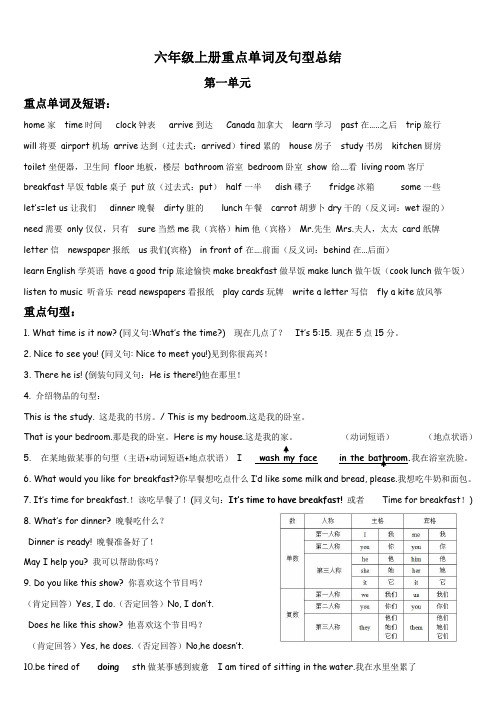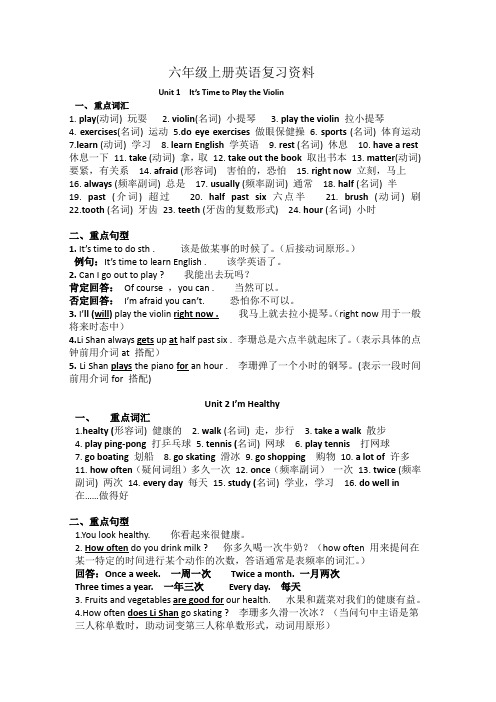六年级上册英语重点单词、重点句子总复习
- 格式:docx
- 大小:666.85 KB
- 文档页数:8

六年级上册英语重点知识点归纳1.六年级上册英语重点知识点归纳篇一museum博物馆bookstore书店cinema电影/院turn转弯hospital医院left向左post office邮局science科学right向右straight笔直地crossing十字路口2.六年级上册英语重点知识点归纳篇二by乘bus公共汽车onfoot步行plane飞机taxi出租车ship(大)船subway地铁train火车slow慢的stop停下always总是,一直usually通常often经常sometimes有时候never从来不3.六年级上册英语重点知识点归纳篇三Wait!等一等!Hooray太好了!I see. 我明白了。
Go at a green light 绿灯行Stop at a red light 红灯停Wait at a yellow light 黄灯等4.六年级上册英语重点知识点归纳篇四How do you go to school? 你怎么去上学?Usually I go to school on foot. Sometimes I go by bus.通常我步行去上学。
有时候骑自行车去。
How can I get to Zhongshan Park ? 我怎么到达中山公园?You can go by the No. 15 bus. 你可以坐15路公共汽车去。
I am far from school now. 我现在离学校很远。
5.六年级上册英语重点知识点归纳篇五tomorrow明天film电影supermarket超市trip旅行tonight在今晚evening晚上/傍晚next week下周comic连环画杂志dictionary词典word单词postcard明信片visit拜访6.六年级上册英语重点知识点归纳篇六What about you?你呢?Here they are!它们在这儿!Can I help you?我能帮助你吗?Sounds great!听起来很棒!Have a good time!玩得开心!You too.你也是7.六年级上册英语重点知识点归纳篇七What are you going to do on the weekend? 你周末打算做什么?I'm going to visit my grandparents this weekend? 这个周末我打算去看望我的外祖父母。

【Unit 1 How do you go to school?】一、重点短语:by plane 坐飞机by ship 坐轮船on foot步行by bike 骑自行车by bus 坐公共汽车by train 坐火车traffic lights 交通灯traffic rules交通规则go to school 去上学get to 到达get on上车get off下车Stop at a red light. 红灯停Wait at a yellow light. 黄灯等Go at a green light. 绿灯行二、重点句型:1.How do you go to school? 你怎么去上学?ually I go to school on foot. Sometimes I go by bus.通常我步行去上学。
有时候骑自行车去。
3.How can I get to Zhongshan Park ? 我怎么到达中山公园?4.You can go by the No. 15 bus. 你可以坐15路公共汽车去。
三、重点语法:1、There are many ways to go somewhere.到一个地方去有许多方法。
这里的ways一定要用复数。
因为there are是There be句型的复数形式。
2、on foot 步行乘坐其他交通工具大都可以用介词by…,但是步行只能用介词on 。
4、go to school的前面绝对不能加the,这里是固定搭配。
5、USA 和US 都是美国的意思。
另外America也是美国的意思。
6、go to the park 前面一定要加the. 如果要去的地方有具体的名字,就不能再加the ,如果要去的地方没有具体名字,都要在前面加the. ( go to school除外。
)7、How do you go to …?你怎样到达某个地方?如果要问的是第三人称单数,则要用:How does he/she…go to …?8、反义词:get on(上车)---get off(下车) near(近的)—far(远的) fast(快的)—slow(慢的)because(因为)—why(为什么) same(相同的)—different(不同的)9、近义词:see you---goodbye sure---certainly---of course10、频度副词:always 总是,一直usually 通常often经常sometimes 有时候never 从来不【Unit 2 Where is the science museum?】一、重点短语:library 图书馆post office 邮局hospital医院cinema 电*bookstore书店science museum科学博物馆turn left向左转turn right 向右转go straight 直行north北south南east东west西next to靠近、与……。

六年级上册一到三单元英语笔记Unit 1 How can I get there?一、重点单词。
1. science museum(科学博物馆)- “science”是“科学”的意思,例如:Science helps us understand the world better.(科学帮助我们更好地理解世界。
)- “museum”是“博物馆”,可数名词。
2. post office(邮局)- “post”有“邮政、邮寄”的意思,“office”是“办公室”,合起来就是办理邮政业务的地方。
3. bookstore(书店)- 由“book(书)”和“store(商店)”组成。
4. cinema(电影院)- 去电影院看电影可以说“go to the cinema”。
5. hospital(医院)- 如果说“in the hospital”,表示在医院里(不一定是生病住院,可能是看望病人或者在医院工作等);“in hospital”则表示生病住院。
6. crossing(十字路口)- 是“cross(穿过)”的名词形式,例如:Turn left at the second crossing.(在第二个十字路口左转。
)7. turn(转弯)- 常见搭配:“turn left(左转)”“turn right(右转)”“turn around (转身)”。
8. left(左边)- 反义词是“right(右边)”,例如:The bookstore is on the left.(书店在左边。
)二、重点短语。
1. near(在……附近)- 例如:My home is near the school.(我的家在学校附近。
)2. next to(紧挨着)- 它比“near”表示的距离更近,如:The library is next to the post office.(图书馆紧挨着邮局。
)3. in front of(在……前面)- 注意与“in the front of”的区别,“in the front of”表示在物体内部的前面,例如:The teacher stands in the front of the classroom.(老师站在教室的前面,是在教室内部);而“in front of”是在物体外部的前面,如:There is a tree in front of the house.(房子前面有一棵树)。

第一单元重点单词及短语:home家time时间clock钟表arrive到达Canada加拿大learn学习past在…..之后trip旅行will将要airport机场arrive达到(过去式:arrived)tired累的house房子study书房kitchen厨房toilet坐便器,卫生间floor地板,楼层bathroom浴室bedroom卧室show 给….看living room客厅breakfast早饭table桌子put放(过去式:put)half一半dish碟子fridge冰箱some一些let’s=let us让我们dinner晚餐dirty脏的lunch午餐carrot胡萝卜dry干的(反义词:wet湿的)need需要only仅仅,只有sure当然me我(宾格)him他(宾格)Mr.先生Mrs.夫人,太太card纸牌letter信newspaper报纸us我们(宾格) in front of在….前面(反义词:behind在…后面)learn English学英语have a good trip旅途愉快make breakfast做早饭make lunch做午饭(cook lunch做午饭)listen to music 听音乐read newspapers看报纸play cards玩牌write a letter写信fly a kite放风筝重点句型:1. What time is it now? (同义句:What’s the time?) 现在几点了?It’s 5:15. 现在5点15分。
2. Nice to see you! (同义句: Nice to meet you!)见到你很高兴!3. There he is! (倒装句同义句:He is there!)他在那里!4. 介绍物品的句型:This is the study. 这是我的书房。
/ This is my bedroom.这是我的卧室。

六年级上册英语复习资料Unit 1 It’s Time to Play the Violin一、重点词汇1.play(动词) 玩耍2. violin(名词)小提琴3. play the violin拉小提琴4. exercises(名词) 运动5.do eye exercises 做眼保健操6. sports (名词) 体育运动7.learn (动词) 学习8.learn English学英语9. rest (名词) 休息10. have a rest休息一下11. take (动词) 拿,取12. take out the book取出书本13. matter(动词)要紧,有关系14. afraid (形容词) 害怕的,恐怕15. right now 立刻,马上16. always (频率副词) 总是17. usually (频率副词) 通常18. half (名词) 半19. past (介词) 超过20. half past six六点半21. brush (动词) 刷22.tooth (名词) 牙齿23.teeth (牙齿的复数形式) 24.hour (名词) 小时二、重点句型1. It’s time to do sth .该是做某事的时候了。
(后接动词原形。
)例句:It’s time to learn English .该学英语了。
2. Can I go out to play ?我能出去玩吗?肯定回答:Of course ,you can . 当然可以。
否定回答:I’m afraid you can’t. 恐怕你不可以。
3. I’ll (will) play the violin right now .我马上就去拉小提琴。
(right now用于一般将来时态中)4.Li Shan always gets up at half past six .李珊总是六点半就起床了。
(表示具体的点钟前用介词at 搭配)5. Li Shan plays the piano for an hour .李珊弹了一个小时的钢琴。

六年级上册英语重点单词句子默写一、重点单词1. apple - 苹果I like to eat a juicy apple for snack.2. book - 书Please bring your math book to class tomorrow.3. cat - 猫My sister has a cute black and white cat.4. dog - 狗His dog is very friendly and likes to play fetch.5. elephant - 大象The zoo has a baby elephant that you can feed.6. fish - 鱼We went fishing and caught several big fish.7. game - 游戏Can we play a game of chess after dinner?8. horse - 马She loves riding horses in her free time.9. ice cream - 冰淇淋I would like a scoop of chocolate ice cream, please.10. juice - 果汁The orange juice tastes refreshing on a hot day.11. kangaroo - 袋鼠Australia is known for its unique wildlife, including kangaroos.12. lion - 狮子We saw a lion sleeping in the shade at the zoo.13. monkey - 猴子The monkey swung from branch to branch in the jungle.14. nurse - 护士My aunt is a nurse who takes care of sick people.15. owl - 猫头鹰The owl hooted loudly in the middle of the night.16. panda - 熊猫Pandas are native to China and are a symbol of peace.17. quiz - 测验We have a history quiz tomorrow, so I need to study.18. rabbit - 兔子The fluffy white rabbit hopped around in the garden.19. soccer - 足球I enjoy playing soccer with my friends on weekends.20. tiger - 老虎The tiger is a fierce predator in the wild.二、重点句子1. My favorite fruit is an apple.(我最喜欢的水果是苹果。
PEP六年级上册四会单词及句子复习Unit1第一单元四会单词:Sciencemuseum科学博物馆postoffice邮局bookstore书店cinema电影院hospital医院crossing十字路口turnleft向左转gostraight直走turnright向右转四会句子:1--Whereisthemuseumshop博物馆的商店在哪儿--It`snearthedoor在大门附近2--Howcanwegetthere我们怎么到那儿--Turnleftatthebookstore到书店左转Unit2第二单元四会单词:onfoot走路bybus乘公共汽车bytaxi乘出租车byplane乘飞机bysubway乘地铁byship乘船bytrain乘火车slowdown减速stop停下wait等go走四会句子:1--Howdoyoucometoschool你怎么来学校的--Usually,Icomeonfoot通常我走路来2IntheUSApeopleonbikesmustwearone.在美国骑自行车的人必须戴头盔;3 Don’tgoattheredlight别闯红灯;4Imustpayattentiontothetrafficlights我必须注意交通信号灯Unit3第三单元四会单词:visitmygrandparents拜访我的外祖父母seeafilm看电影takeatrip远行gotothesupermarket去超市dictionary词典comicbook连环画书wordbook单词书postcard明信片四会句子:1--Whatareyougoingtodotomorrow你明天打算做什么--I’mgoingtohaveanartlesson.我要上美术课2 We’regoingtodrawsomepicturesinRenminPark.我要到人民公园去画画3--Whereareyougoing你们打算去哪儿--We`regoingtothecinema我们打算去电影院4Whenareyougoing你们什么时候去Unit4第四单元四会单词:dancing跳舞singing唱歌readingstories看故事书playingfootball踢足球doingkungfu打功夫cooksChinesefood做中国菜studiesChinese学习汉语doeswordpuzzles猜字谜goeshiking远足四会句子:1--WhatarePeter`shobbies彼得有什么爱好--Helikesreadingstories他喜欢读故事2--DoesheliveinSydney他住在悉尼吗--No,hedoesn`t不,他没有3--Doeshelikedoingwordpuzzlesandgoinghiking他喜欢猜字谜和远足吗--Yes,hedoes是的,他喜欢Unit5第五单元四会单词:factoryworker工厂工人postman邮递员businessman生意人policeofficer警察fisherman渔民scientist科学家pilot飞行员coach教练四会句子:1--Whatdoeshedo他是做什么的--Heisabusinessman.他是商人2--Wheredoeshework他在哪儿工作--Heworksatsea.他在海上工作;3--Howdoeshegotowork他怎么上班--Hegoestoworkbybike.他骑自行车上班;Unit6第六单元四会单词:angry生气的afraid害怕的sad悲伤地worried担心的happy开心的seeadoctor看医生domoreexercise做更多的锻炼takeadeepbreath深深吸一口气wearwarmclothes穿暖和的衣服counttoten数到十四会句子:1 They’reafraidofhim.它们害怕它2Thecatisangrywiththem.这只猫生它们的气;3What`swrong怎么了Yourfatherisill.你爸爸生病了;4Heshouldseeadoctorhismorning.他今天早上应该去看病;5Don`tbesad.别伤心PEP六年级上册常用句型问路和指路-Whereis+地点名词……在哪儿-It’s+介词短语.在……;-Howcanwe/Igetto...我们/我怎么到……呢-Turnleft/right./Gostraight./Youcangoby+交通工具.左/右转;直走;/你可以乘坐……去那儿;询问并回答对方来或去某地的交通方式:Howdoyoucome/goto+地点你/你们怎么来/去……I/Wecome/goto+地点+bybike/onfoot….我/我们骑自行车/步行……来/去……询问对方某个时间打算做某事的句型及答语:-Whatareyougoingtodo+表示将来的时间你……打算去做什么-I’mgoingto+动词原形+将来的时间.我打算……去做……询问对方打算去哪儿的句型及答语:Whereareyougoing+表示将来的时间你……打算去哪儿I’mgoingto+表示地点的名词.我打算……去….询问对方打算什么时候去做某事的句型及答语:Whenareyougoing+动词原形你打算什么时候去……Iamgoingto+动词原形+将来时间.我打算……去……;注:begoingto+动词原形=will+动词原形询问别人的爱好并作出回答:Whatis/are某人的hobby/hobbies……有什么爱好=Whatdo/does某人like主语+like/likes+动词-ing+其他.……喜欢做……=某人的hobby is/are….某人的爱好是...;助动词does引导的一般疑问句及答语:Does+第三人称单数主语+动词原形+其他……做……吗-Yes,he/she/itdoes.No,he/she/itdoesn’t.是的,他/她/它是;不,他/她/它不是;询问他人的职业并作出回答:Whatdo/does+主语+do......是做什么的=Whatbe+某人主语+be动词+a/an+职业名词.……是……询问他人的工作地点并作出回答:Wheredo/does+主语+work……在哪儿工作主语+work/works+表示地点的副词或介词短语;……在……工作;询问他人怎么去上班:Howdo/does+主语+gotowork主语+gotowork+bybike/onfoot….询问他人正在做什么及描述正在做某事:What+be+某人+doing主语+be动词+动词-ing+其他….正在…Don’t祈使句:Don’t+动词原形+其他.不要……Don’t+be+形容词+其他.不要……表达对某人或某事的关心:What’wrongwith+某人描述及提问某人的感受的句型:How+do/does某人+feel主语+feel/feels+表示感受的形容词+其他.=主语+be动词+表示感受的形容词+其他.……是……用should来给对方提建议及征求意见的句型:Whatshould某人+do某人should+动词原形.你应该…..语法复习一、现在进行时态3种变化规律1.直接加ing:do—doing draw—drawing cook—cooking answer—answering read—reading listen—listening fly—flying sing—singing play—playing2.去掉末尾的e加ing:write—writing dance—dancing take—taking have—having make—making ride—riding dive—diving3.双写末尾字母加ing:get—getting run—running swim—swimming sit—sitting put—putting你正在干什么WhatareyoudoingI’mansweringthephone.他/她/它正在干什么Whatishe/she/itdoingHe’s/She’s/It’s …他她、它们正在干什么WhataretheydoingTheyare…看到like或likes后面的动词要加上ing二、一般将来时态begoingto/will+动词原形表示一般将来时的时间状语有:thismorning,thisafternoon,thisevening,tomorrow,tonight,thisweekend,ontheweekend,nextweek,nextmonth,nextyear,nextweekend.例:今晚你将要做什么Whatareyougoingtodothisevening—I’mgoingtothecinema.I’mgoingtovisitmygrandparents.你将什么时候去Whenareyougoing—I’mgoingat7:10.你将怎样去呢Howareyougoing—I’mgoingbybus.今天下午你将要去哪里Whereareyougoingthisafternoon—I’mgoingtothebookstore.你将要买什么呢WhatareyougoingtobuyI’mgoingtobuyacomicbook.你将和谁一起去WhoareyougoingwithI’mgoingwithmyparents.三、第三人称单数后面的动词要加s或es1.一般情况加s,如:read—reads;live—lives;play—plays;sing—sings2.动词末尾以s,x,ch,sh或部分以o结尾的加es记住课本中出现的这几个:watches,teaches,goes,does,washes,passes3.辅音字母+y结尾的把y变i再加es,如:fly—flies;study—studies4.特殊情况:have--has5.第三人称单数包括:he;she;it;myfather/friend;Amy/Hangzhou等一个人名或地名;例如:Helikesdrawingpictures.Sheworksinacarcompany.Itcomesfromtheclouds.Myfathergoestoworkonfoot.LiLeioftenplayscomputergamesafterlunch.6.一般疑问句记住:前面助动词加了es,后面动词就不变化了;如:DoessheteachEnglishDoesyourpenpalliveinHangzhou四、不定冠词a和an的用法a用于辅音因素开头的单词前;an用于元音因素开头的单词前;记住课本中出现的要用an的单词:anactor;anactress;anartist;anengineer;anaccountant;anEnglishbook;anorange;anapple;anoldwoman五、动词变化为表示职业或人的单词1.动词后面加er:work—worker;teach—teacher;sing—singer;TV report—TVreporterclean—cleaner2.动词后面加or:act—actor;doctor3.末尾以e结尾的直接加r:write—writer;dance—dancer;drive—driver4.动词后面加ist:art—artist;tour—tourist5.职业男女有区别的:警察policeman—policewoman;演员actor—actress六、8个疑问词which哪一个what什么when什么时候where哪里whose谁的why为什么how怎么样who谁七、人称代词和物主代词I—my-mine我—我的-我的you—your-yours你;你们—你的;你们的-你的;你们的he—his-his他—他的-他的she—her-hers她—她的-她的we—our-ours我们—我们的-我们的they—their-theirs他们/她们/它们—他们的/她们的/它们的他们的/她们的/它们的八、can后面加动词原形WhatcanyoudoIcancookthemeals.Hecanflykites.Shecan playtheviolin.弹小提琴PEP小学英语六年级上册各单元作文一、介绍你和家人上学或上班的方式Igotoschoolonfoot.Mysistergoestoschoolonfoot,too.Mybrothergoestoschoolby bike.Myfathergoestoworkbycar.Mymothergoestoworkbybike.二、看图,说说你怎样去电影院Igotothecinema.Istartfromhere.Gostraightforfiveminutes.Thenturnleftatthe library.Gostraightforoneminute.Thelibraryisontheright.三、读读下周末你和朋友的计划I’mgoingtohaveabusyweekendwithmyfriends.OnSaturdaymorning,wearegoingtog oshpping.OnSaturdayafternoon,wearegoingtothepark.OnSundaymorning,wearego ingtogofishing.OnSundayafternoon,wearegoingtoflykites.Wewillbehappy.四、说说你和你家人的爱好;Ilikeflyingkites.Myfatherlikesdiving.Mymotherlikesplayingthepipa.Mybroth erlikesridingabike.Mysisterlikeslisteningtomusic.MyfriendJohnlikesflying kites.Amylikescollectingstamps.ZhangPenglikesplayingfootball.ChenJielike sridingabike.五、介绍你一家人的职业和上班地点和方式;Myfatherisateacher.Heworksinaschool.Hegoestoworkbycar.Mymotherisanaccoun tant.Sheworksinabank.Shegoestoworkbybus.六、写一封信给你的笔友,介绍你一家人的情况;DearAmy,MynameisSarah.I’m13.I’mtallandthin.Ilikeswimming.Myfatheris40.He’stal landstrong.Helikesreadingbooks.Heisworker.Heworksinafactory.Hegoestowork bycar.M ymotheris39.She’sshortandthin.Shelikescooking.Sheworksinabooksto re.Shegoestoworkonfoot.Yours,Sarah七、看图介绍图中这个人的情况;HeisBen.Heis26.Heisapoliceman.Hegoestowork bybus.Helikesplayingtheviolin.Helikesgoingfishing,too.。
六年级上册英语一到六单元知识总结Unit 1 How can I get there?一、重点单词。
1. 地点名词。
- science museum(科学博物馆),post office(邮局),bookstore(书店),cinema(电影院),hospital(医院),crossing(十字路口),turning(转弯处)等。
2. 方位介词及短语。
- near(在……附近),next to(紧挨着),in front of(在……前面),behind(在……后面),between…and…(在……和……之间)。
3. 动词短语。
- turn left(向左转),turn right(向右转),go straight(直走)。
二、重点句型。
1. - Where is the library?- It's near the post office.2. - How can I get to the hospital?- Turn left at the bookstore. Then go straight.三、语法点。
1. 特殊疑问句的用法:以特殊疑问词(where, how等)开头,用来询问地点、方式等信息。
2. 一般现在时在问路指路中的运用。
Unit 2 Ways to go to school.一、重点单词。
1. 交通工具名词。
- by bike(骑自行车),by bus(乘公共汽车),by train(乘火车),by plane(乘飞机),on foot(步行),ship(轮船),subway(地铁)等。
2. 形容词。
- slow(慢的),fast(快的)。
3. 其他。
- traffic(交通),traffic lights(交通灯),stop(停),wait(等)。
二、重点句型。
1. - How do you come to school?- Usually, I come on foot.2. - How can I get to the Fuxing Hospital?- Take the No. 57 bus over there.三、语法点。
六年级英语上册重点单词、短语和句子Unit1 How can I get there一、单词:(1)科学 science(2)博物馆 museum(3)邮局post office (4)书店 bookstore(5)电影院 cinema(6)医院 hospital (7)十字路口 crossing(8)转弯 turn(9)左left(10)右 right(11)笔直地 straight二、短语:(1)next to 在……隔壁(2) in front of 在……前面(3) turn left 向左转(4) turn right 向右转(5) go straight 直走(6) take the No.12 bus 乘坐第12 路公交车(7) science museum 科学博物馆(8) Italian restaurant 意大利餐馆(9) post office 邮局(10) pet hospital 宠物医院(11) Dongfang street 东方街道(12) nature park 自然公园(13) an interesting film 一部有趣的电影(14) get there 到达那(15) get to 到达(16) over there 在那边(17) a talking robot 一个会说话的机器人三、句子:(1)博物馆商店在哪儿?Where is the museum shop?在大门附近。
It’s near the door.(2)邮局在哪儿?Where is the post office?与博物馆相邻。
It’s next to the museum.(3)我们怎么到那儿?How can we get there?到书店左转,然后到医院右转Turn left at the bookstore. Then turn right at the hospital.Unit2 Ways to go to school一、单词:(1)步行 on foot(2)乘 by(3)公共汽车 bus(4)飞机 plane(5)出租车 taxi(6)大船 ship(7)地铁 subway(8)火车 train(9) slow(使)放慢速度;慢的(10) 减少; 降低 down(11)慢下来 slow down(12)停下 stop二、短语:(1)on foot 步行(2) by bus 乘坐公交车(3) by plane 乘飞机(4)by taxi 坐出租车(5) by ship 乘坐轮船(6) by boat 坐小船(7) buy train 坐火车(8) by subway 坐地铁(9) by bike 骑行(10) by car 坐小汽车(11) by ferry 乘坐渡船(12) by sled 坐雪橇(13) go to school 去上学(说话时不在学校)(14) come to school 来上学(说话时在学校)(15) pay attention to 注意……(16) traffic lights 交通信号灯(17) good exercise 有益的锻炼/运动(18) get there 到那儿(19) so many 如此多(20) cross the road 过马路(21)a life jacket 救生衣(22) drive slowly 开慢点(23) be different from 与……不同(24) take a bus 乘坐公交车(25) ride a bike 骑自行车(26) on the left side 在左边(27) on the right side 在右边(28) the same as 与……一样(28) go to work 去工作/去上班(29) at the cinema 在电影院(30) play with sb 和某人玩(31) go home 回家(32) at school 在学校(33) at home 在家三、句子:(1)你怎么来学校的?How do you come to school.通常我步行来,有时我乘公共汽车来。
PEP六年级上册四会单词及句子复习Unit1第一单元四会单词:Science museum科学博物馆post office邮局bookstore书店cinema电影院hospital医院crossing十字路口turn left向左转go straight直走turn right向右转四会句子:1-- Where is the museum shop?博物馆的商店在哪儿?--It`s near the door在大门附近2 --How can we get there?我们怎么到那儿?--Turn left at the bookstore到书店左转Unit2第二单元四会单词:on foot走路by bus乘公共汽车by taxi乘出租车by plane乘飞机by subway乘地铁by ship乘船by train乘火车slow down减速stop停下wait等go走四会句子:1-- How do you come to school?你怎么来学校的?--Usually,I come on foot通常我走路来2In the USA people on bikes must wear one.在美国骑自行车的人必须戴头盔。
3Don’t go at the red light!别闯红灯。
4I must pay attention to the traffic lights我必须注意交通信号灯Unit3第三单元四会单词:visit my grandparents拜访我的外祖父母see a film看电影take a trip远行go to the supermarket去超市dictionary词典comic book连环画书word book单词书postcard明信片四会句子:1 --What are you going to do tomorrow?你明天打算做什么?--I’m going to have an art lesson.我要上美术课2We’re going to draw some pictures in Renmin Park.我要到人民公园去画画3 --Where are you going?你们打算去哪儿?--We`re going to the cinema我们打算去电影院4When are you going?你们什么时候去?Unit4第四单元四会单词:dancing跳舞singing唱歌reading stories看故事书playing football 踢足球doing kung fu打功夫cooks Chinese food做中国菜studies Chinese 学习汉语does word puzzles猜字谜goes hiking远足四会句子:1 --What are Peter`s hobbies?彼得有什么爱好? --He likes reading stories他喜欢读故事2 --Does he live in Sydney?他住在悉尼吗? --No,he doesn`t不,他没有3 --Does he like doing word puzzles and going hiking?他喜欢猜字谜和远足吗?--Yes,he does是的,他喜欢Unit5第五单元四会单词:factory worker工厂工人postman邮递员businessman生意人police officer警察fisherman渔民scientist科学家pilot飞行员coach教练四会句子:1 --What does he do?他是做什么的?--He is a businessman.他是商人2--Where does he work?他在哪儿工作?-- He works at sea.他在海上工作。
3 --How does he go to work?他怎么上班?--He goes to work by bike.他骑自行车上班。
Unit6第六单元四会单词:angry生气的afraid害怕的sad悲伤地worried担心的happy开心的see a doctor看医生do more exercise做更多的锻炼take a deep breath深深吸一口气wear warm clothes穿暖和的衣服count to ten数到十是。
不,他/她/它不是。
询问他人的职业并作出回答:What do/does+主语+do?......是做什么的?=What be+某人?主语+be动词+a/an+职业名词.……是……询问他人的工作地点并作出回答:Where do/does+主语+work?……在哪儿工作?主语+work/works+表示地点的副词或介词短语。
……在……工作。
询问他人怎么去上班:How do/does+主语+go to work?主语+go to work+by bike/on foot….询问他人正在做什么及描述正在做某事:What+be+某人+doing?主语+be动词+动词-ing+其他….正在…Don’t祈使句:Don’t+动词原形+其他.不要……Don’t+be+形容词+其他.不要……表达对某人或某事的关心:What’wrong(with+某人)?描述及提问某人的感受的句型:How+do/does某人+feel?主语+feel/feels+(表示感受的)形容词+其他.=主语+be动词+(表示感受的)形容词+其他.……是……用should来给对方提建议及征求意见的句型:What should某人+do?某人should+动词原形.你应该…..语法复习一、现在进行时态(3种变化规律)1.直接加ing:do—doing draw—drawing cook—cooking answer—answering r ead—reading listen—listening fly—flying sing—singing play—pl aying2.去掉末尾的e加ing:write—writing dance—dancing take—taking have—having make —making ride—riding dive—diving3.双写末尾字母加ing:get—getting run—running swim—swimming sit—sitting put—p utting你正在干什么?What are you doing?I’m answering the phone.他/她/它正在干什么?What is he/she/it doing?He’s/She’s/It’s…他(她、它)们正在干什么?What are they doing?They are…看到like或likes后面的动词要加上ing二、一般将来时态(be going to/will+动词原形)表示一般将来时的时间状语有:this morning,this afternoon,this evening,tomorrow,tonight,this we ekend,on the weekend,next week,next month,next year,next week end.例:(今晚)你将要做什么?What are you going to do(this evening)?—I’m going to the cinema.I’m going to visit my grandparents.你将什么时候去?When are you going?—I’m going at7:10.你将怎样去呢?How are you going?—I’m going by bus.今天下午你将要去哪里?Where are you going this afternoon?—I’m going to the bookstore.你将要买什么呢?What are you going to buy?I’m going to buy a comic book.你将和谁一起去?Who are you going with?I’m going with my parents.三、第三人称单数后面的动词要加s或es1.一般情况加s,如:read—reads;live—lives;play—plays;sing—sings2.动词末尾以s,x,ch,sh或部分以o结尾的加es(记住课本中出现的这几个:watches,teaches,goes,does,washes,passes)3.辅音字母+y结尾的把y变i再加es,如:fly—flies;study—studies4.特殊情况:have--has5.第三人称单数包括:he;she;it;my father/friend;Amy/Hangzhou 等一个人名或地名。
例如:He likes drawing pictures.She works in a car company.It comes from the clouds.My father goes to work on foot.Li Lei often plays computer games after lunch.6.一般疑问句记住:前面助动词加了es,后面动词就不变化了。
如:Does she teach English?Does your pen pal live in Hangzhou?四、不定冠词a和an的用法a用于辅音因素开头的单词前;an用于元音因素开头的单词前。
记住课本中出现的要用an的单词:an actor;an actress;an artist;an engineer;an accountant;an English book;an orange;an apple;an old woman五、动词变化为表示职业或人的单词1.动词后面加er:work—worker;teach—teacher;sing—singer;TV report—TV reporter clean—cleaner2.动词后面加or:act—actor;doctor3.末尾以e结尾的直接加r:write—writer;dance—dancer;drive—driver4.动词后面加ist:art—artist;tour—tourist5.职业男女有区别的:警察policeman—policewoman;演员actor—actress六、8个疑问词which(哪一个)what(什么)when(什么时候)where(哪里)whose(谁的)why(为什么)how(怎么样)who(谁)七、人称代词和物主代词I—my-mine(我—我的-我的)you—your-yours(你;你们—你的;你们的-你的;你们的)he—his-his(他—他的-他的)she—her-hers(她—她的-她的)we—our-ours(我们—我们的-我们的)they—their-theirs(他们/她们/它们—他们的/她们的/它们的他们的/她们的/它们的)八、can后面加动词原形What can you do?I can cook the meals.He can fly kites.She can play the violin.(弹小提琴)PEP小学英语六年级上册各单元作文一、介绍你和家人上学或上班的方式I go to school on foot.My sister goes to school onfoot,too. My brother goes to school by bike. My father goes to work by car. My mother goes to work by bike.二、看图,说说你怎样去电影院I go to the cinema. I start from here. Go straight for five minutes. Then turn left at the library. Go straight for one minute. The library is on the right.三、读读下周末你和朋友的计划I’m going to have a busy weekend with my friends. On Saturday morning,we are going to go shpping. On Saturday afternoon, we are going to the park. On Sunday morning,we are going to go fishing. On Sunday afternoon,we are going to fly kites. We will be happy.四、说说你和你家人的爱好。